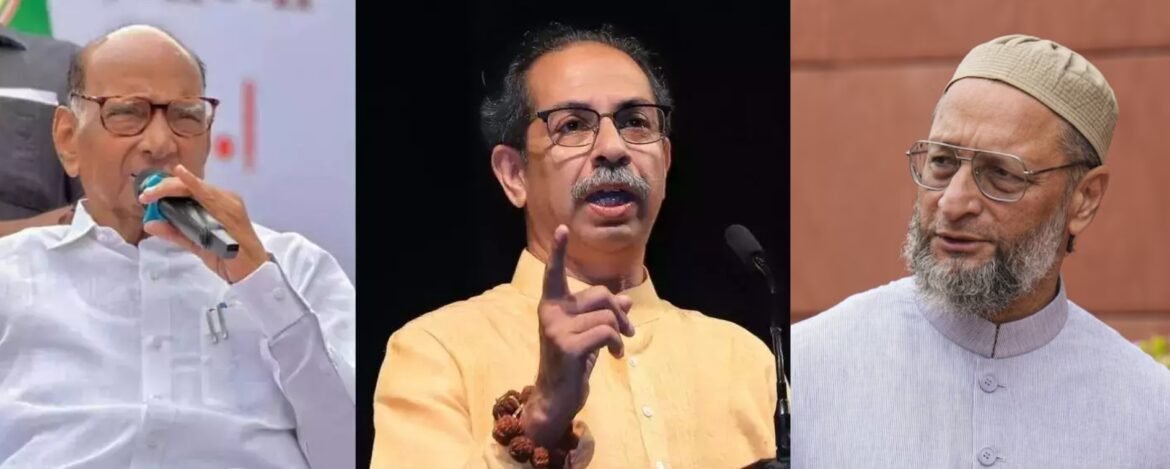In a significant development ahead of the upcoming assembly elections, the Maharashtra political landscape witnesses major changes as political parties gear up for intense negotiations and alliances. One of the key factors reshaping the political dynamics is the proposal by Asaduddin Owaisi’s All India Majlis-e-Ittehadul Muslimeen (AIMIM) to join forces with the Maha Vikas Aghadi (MVA). However, the party’s entry into the coalition has met resistance from within, particularly from the Uddhav Thackeray-led Shiv Sena (UBT) faction, which has expressed opposition to AIMIM’s inclusion.
AIMIM’s Proposal to Maha Vikas Aghadi
AIMIM, led by Asaduddin Owaisi, has officially submitted a written proposal to form an alliance with the Maha Vikas Aghadi, a coalition that includes several influential political parties in Maharashtra, such as the Congress, Nationalist Congress Party (NCP) (Sharad Pawar faction), Shiv Sena (UBT), Samajwadi Party, and other leftist and regional groups. The AIMIM is seeking to contest a select number of constituencies, primarily in Muslim-dominated areas, as part of the MVA alliance.
According to sources, the AIMIM has listed 28 constituencies where it intends to field candidates. These constituencies, spread across key regions like Mumbai, Aurangabad, Bhiwandi, and Nanded, are areas where Muslim voters have a decisive role in determining the outcome. Some of the prominent constituencies include Dharavi, Byculla, Mumba Devi, and Malegaon Central. While AIMIM is keen to join the alliance, the party has also indicated flexibility, stating it is willing to leave some seats for other allies if an agreement is reached.
Opposition from Shiv Sena (UBT)
Despite AIMIM’s efforts to join the Maha Vikas Aghadi, the Uddhav Thackeray-led Shiv Sena (UBT) has openly opposed the move. According to the Thackeray faction, the MVA already consists of a wide range of political parties and does not need the addition of AIMIM. The UBT’s leadership pointed out that the coalition includes parties such as Congress, NCP, Samajwadi Party, Communist Party, and the Republican Organization, and therefore, there is no room for new entrants.
The resistance stems from longstanding political differences between the Shiv Sena (UBT) and AIMIM. The Thackeray faction is reportedly concerned that AIMIM’s inclusion could alienate some of its core voters and disrupt the delicate balance of the coalition. This opposition may prove to be a significant hurdle for AIMIM as it seeks to establish itself as a formidable force in the upcoming Maharashtra elections.
Uncertainty in Alliance Formation
While AIMIM has formally submitted its proposal, no final decision has been made by the other key members of the Maha Vikas Aghadi, particularly Congress and the NCP (Sharad Pawar faction). The proposal remains under consideration, with neither party accepting nor rejecting AIMIM’s inclusion outright. This uncertainty has created speculation about the potential impact of AIMIM’s entry into the alliance, with analysts suggesting that AIMIM may face a setback if consensus among the coalition partners cannot be reached.
Political insiders suggest that the internal dynamics of the MVA will play a crucial role in determining AIMIM’s future within the alliance. The hesitation from key parties reflects a broader concern about balancing the interests of various political factions, each with its own voter base and electoral strategies.
Broader Implications for Maharashtra’s Political Landscape
The Maharashtra political landscape witnesses major changes as various parties maneuver for power in the lead-up to the assembly elections. The MVA, which was formed to counter the Bharatiya Janata Party (BJP), is currently navigating complex negotiations to present a united front. AIMIM’s potential inclusion in the alliance could shift the electoral strategy, particularly in constituencies with a significant Muslim population, but it also risks creating fractures within the coalition.
Meanwhile, AIMIM’s move to secure 28 constituencies indicates its growing ambition to expand its influence beyond traditional strongholds. The party’s focus on Muslim-majority areas, such as Kalina, Kurla, and Bandra East, suggests that it sees these seats as winnable in the current political climate. However, its ability to succeed will depend on whether it can overcome opposition from within the MVA and form a stable alliance.
Future of Maha Vikas Aghadi
As the Maharashtra political landscape witnesses major changes, the future of the Maha Vikas Aghadi remains in flux. Key players, including Congress and NCP, are likely to weigh the pros and cons of AIMIM’s inclusion carefully before making a final decision. If AIMIM is ultimately accepted into the alliance, it could bring in additional support from Muslim voters, strengthening the MVA’s position in crucial constituencies. However, the challenge will be maintaining unity within the coalition while accommodating diverse political interests.
Conclusion
As Maharashtra’s political landscape witnesses major changes, the ongoing negotiations between AIMIM and the Maha Vikas Aghadi could significantly reshape the state’s electoral dynamics. With AIMIM’s proposal still under consideration and opposition from the Shiv Sena (UBT), the final outcome remains uncertain. However, the stakes are high as all parties involved seek to maximize their influence in the upcoming assembly elections.
Stay connected to know more on arcnews.online for global news like Maharashtra Political Landscape Witness Major Changes. For videos updates visit our YouTube. Do subscribe to Arcnews to get latest updates directly in your mail box.
Have A Great Day.


